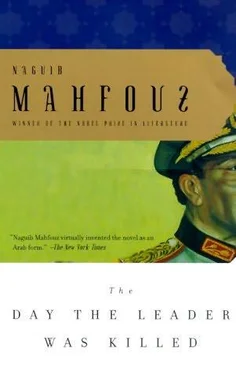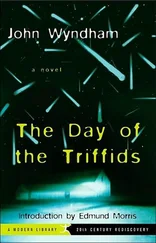“Children, we’re finally gathered together as one happy family!” I cried joyfully, looking at them one by one.
“A drop of rest in a sea of fatigue,” said Fawwaz in his loud voice.
“Had things been different, we would’ve gone off to the Qanater Gardens.”
“An idea quite out of keeping with the times.Actually, it’s a crazy idea.”
“We eat and sleep. That’s what’s left of the feast.”
“And you, Elwan?”
“I’ll walk over to the Café.”
“Gossip as usual!” said Fawwaz with a smile.
“Once again, the feast coincides with another festive occasion — Victory Day,” I added.
“Victory and prison,” added Elwan ironically.
“Nothing ever remains the same. There’s always something new under the sun,” I said good-humoredly.
“Really!Long live patience and let’s just keep waiting!”
“A new oil dig or the discovery of an unknown river in the desert,” musedFawwaz.
“Or the outbreak of a revolution,” said Elwan.
“Does revolution mean more than just added destruction?” surmised Fawwaz.
“To make matters even worse than they are!” cried Elwan sarcastically.
They know nothing of revolutions. They haven’t even heard of them. The hired storyteller has told them a false, untrue story. The poor teacher begins his lesson with the treacherous question: What were the causes of the failure of the 1919 revolution?
Goddamn bastards! Have you no drop of decency left? Prison guards…worshipers of Nero… There goes Elwan waving to us as he goes by. Off he goes, burdened by his own disappointment and that of his generation.
“Let’s watch the celebrations,” said Hanaa, switching on the television set.
The general atmosphere is one of immense joy. The President walks by, surrounded by a luminous halo like that of the Night of Fate, clad in his commander’s uniform and the king’s scepter in his hand. Hordes of dignitaries follow.
“He’s ever so pleased with himself,” said Hanaa innocently.
“Today’s his day,” I said.
“He’s happy and deserves to he so,” said Fawwaz. “He’s lost so much since September fifth,” he added sorrowfully.
A ground and air parade all at once: a rare sight, not likely to happen again.
“We would see the army only on Mahmal Day,” I said in a voice echoing from the past.
“Look, Father, that’s a whole other world.”
“His face is all pink as though he’s smeared it with rouge,” said Hanaa with a laugh.
The army units go by and so does time. I start to feel lethargic and sleepy. Then suddenly I wake up at a strange point in time. History and time corner me, saying: That is how the events you skimmed through in history books took place. And now it’s happening right here in the living room. The television screen becomes blurred and an unusual commotion follows: voices are heard and then a blackout.
“Fawwaz, is there anything wrong with the television set?”
“Nothing wrong with the set.I don’t know what happened.”
“Something odd.I don’t feel comfortable,” said Hanaa in a worried tone.
“Me too,” added Fawwaz.
“Is…?“ I asked.
“God only knows, Father. Pretty soon we’ll know everything.”
“God protect us!” I said from the bottom of my heart.
Let this he a festive occasion and let’s forget our worries for an hour or so. But how when there are a hundred chinks in the door? What is the River Nile trying to intimate? And the trees?Listen carefully. They’re saying, Elwan, you poor fellow, trapped within four walls, Randa is coming back to you in the guise of friendship and small talk, in the guise of undeclared love resting on twin pillars of steel and despair, and shrouded in vague dreams. No persecution from family, no hope, and no despair! March at a brisk military pace, for today is soldiers’ day. The café is packed with wordmongers. Here there’s no satisfaction and no action. A transistor radio, brought along for the occasion, is placed on one of the tables between us. Just like on the day the late President broadcast his defeat in June 1967. The late President was greater in his defeat than this one in his glory was the first thing I heard. This reminds me of what my grandfather once said: We are a people more given to defeat than to victory. The strain that spells out despair has become deeply ingrained in us because of the countless defeats we have had to endure. We have thus learned to love sad songs, tragedies, and heroes who are martyrs. All our leaders have been martyrs: Mustafa Kamel, martyr to struggle and sickness; Muhammad Farid and Saad Zaghloul, both martyrs to exile; Mustafa al-Nahhas, martyr to persecution; Gamal Abd al-Nasser, martyr to June 5. As for this victorious, smug one, he has broken the rule: his victory constituted a challenge which gave rise to new feelings, emotions for which we were quite unprepared. He exacted a change of tune, one which had long been familiar to us. For this, we cursed him, our hearts full of rancor. And, ultimately, he was to keep for himself the fruits of victory, leaving us his Infitah, which only spelled out poverty and corruption. This is the crux of the matter.
We were caught up in the heat of arguments as the loudspeaker and transistor radio broadcast the details of Victory Day celebrations to whoever cared to listen. And, as usual, time got the better of us until, suddenly, strange voices could be heard.
“The traitors…the traitors,” cried the broadcaster’s voice.
Tongues grew paralyzed and eyes were averted as heads crowded around the transistor radio. The broadcasting of the celebrations came to a sudden halt, and then some songs started to be broadcast.
“What happened?”
“Something unusual.”
“He said: ‘The traitors, the traitors, the traitors!’”
“An invasion!” “Of whom?”
“Honestly, what a stupid question!”
“The songs being broadcast indicate that…“ “Since when has logic meant anything?”
“A little patience!”
We had no desire to go back home. We all just huddled up in an urge to remain all together in the face of the unknown. We had a quick meal of macaroni for lunch and then sat there waiting. Following a brief hut violent period of time, the broadcaster announced that there had been an abortive attempt on the President’s life, that the President had left, and that the security forces were in full control of the situation. And, once again, there were songs on the radio.
“This, then, is the truth.”
“The truth.”
“Think a little.”
“Certain facts cannot be concealed.”
“But they can be delayed.”
“Who are the assaulters?”
“Who but those involved in the religious movement?”
“But he was sitting in the very midst of soldiers and guards.”
“Listen, they’ve started to broadcast national hymns.”
Suddenly, there was a new broadcast announcing that the President had been slightly injured and that he was getting full medical attention at the hospital. Our hearts leaped up at the thought of increased chances of new possibilities. Time came to a halt, changed its tune, and emerged with a brand-new look on its face.
“The man has been injured. What then?”
“Get ready for prison.”
“A definite return to terrorism.”
“He’ll survive and seek revenge.”
“Will we be hearing the Quran after the hymns?” We whiled away the time that was weighing heavily upon us. Jokes were cracked and then the recitation of the Quran began. At first, we turned pale. It’s true then. Amazing! Actually true!?The man’s finished? Who would’ve believed? Why do we sometimes get a feeling that the impossible is actually possible? Why do we imagine that there exists a reality other than death in this world? Death is the true dictator. The official announcement comes to us like a final statement. I wonder what people are saying? I’d like to hear what is being said around us in the café. I pricked up my ears. There is no power or might save in God. To him alone is permanence. The country is in obvious danger. He doesn’t deserve this end, whatever his misdeeds. On his day of glory? A plot.Surely there’s a conspiracy. No doubt. The hell with him! Death saved him from madness. Anyhow, he had to go. This is what happens to those who imagine that the country is nothing but a dead corpse. No, it’s a foreign conspiracy. He doesn’t deserve this end. It was the inevitable end. He was a curse on us. He who kills will ultimately be killed. In a split second, an empire has collapsed. The empire of robbers.What is the Mafia thinking about right now? I returned to my seat, torn by conflicting feelings of despair, fear, and joy. Vague hopes hovered overhead,hopes of unknown possibilities, hopes that the prevailing lethargy and routine would, at last, be shattered, and that one could start soaring toward limitless horizons. Tomorrow cannot be worse than today. Even chaos is better than despair, and battling with phantoms is better than fear.
Читать дальше












